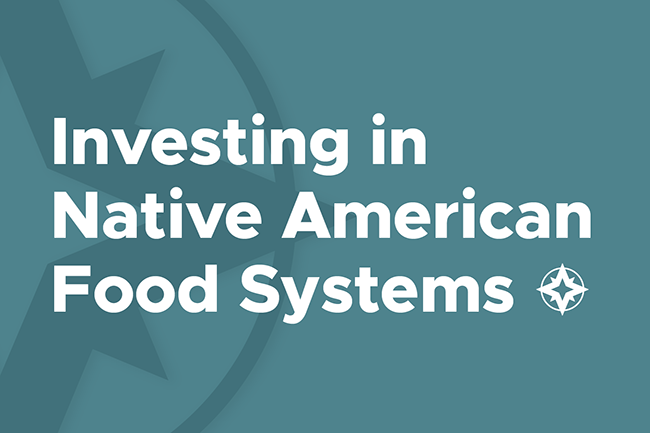Investing in Native American Food Systems

During October, impact investors from around the world convened in San Francisco, California for SOCAP’s annual conference, a week-long deep dive into all aspects of investing for the power of good. Arabella Advisors sent its own team of impact specialists, including associate director Shayna Keller, who represented the firm as the moderator of “Investing in Food Sovereignty in Indian Country.” Joining her on stage was Janie Hipp, CEO at the Native American Agriculture Fund; Colby Duren, director at the Indigenous Food and Agriculture Initiative; Andreas Hipple, executive director at the Better Way Foundation; and Zach Ducheneaux, executive director at the Intertribal Agricultural Council.
The panelists took the stage with two major goals: to educate funders and social investors about investment opportunities in food systems in Indian Country and to provide concrete resources and tools to help philanthropists and social investors increase investment in Native American food systems. While the market value of agricultural products sold by American Indian/Alaska Native producers is over $3.5 billion annually and growing, and while their farms comprise three percent of all farms in the United States, these farmers and ranchers face severe barriers in accessing capital.
The conversation began with a quote from Feeding Ourselves, a powerful recent report on the state of Native food systems, commissioned by the American Heart Association and prepared by Echo Hawk Consulting.
“When we were strong in our foods on this continent, we were stronger people – we were healthier. And for Indigenous peoples it all starts with the food. When Indian Country lost its ability to feed itself, through whatever means, we lost that part of ourselves that supports our ability to thrive. It is only by regaining our foods will we able to restore our health, our resilience as peoples and secure the stability and diversification within our own communities and local economies.”
Discussion moved on to lay important groundwork for understanding this funding area, with speakers explaining why food sovereignty is critical to the physical, cultural, and economic well being of Native communities, examining the current scale of Native agriculture, and discussing resources to identify promising investment opportunities in Indian Country. Statistics on Indian Country farm-to-table agriculture, gathered by the Indigenous Food and Agriculture Initiative, became a key jumping-off point for conversation on the state of food production in Indian Country, which has grown significantly year over year.
The panelists went on to address the capital gap Native American farmers and ranchers face. They shared that Native-led community development finance institutions (CDFIs) struggle to attract investment capital, despite the significant financial and social returns they can provide investors. Because demand for capital far outstrips supply among farmers and ranchers, Native borrowers often turn to corporate, non-Native banks and become locked into financing terms that preclude flexibility in production cycles and transitions toward further economic and environmental sustainability. They wind up trapped in circumstances that ultimately limit long-term growth opportunities. Adequately resourcing Native-led CDFIs is a critical path forward toward achieving greater well being and sovereignty.
As it happens, the current moment is particularly opportune for making such critical investments. A major class-action lawsuit settlement has led to the launch of the Native American Agriculture Fund, a $266 million charitable trust serving Native farmers and ranchers, required to distribute its funds within 20 years. In this context, the field is ripe for co-investment and collaboration that can amplify the impact of every dollar.
In collaboration with IllumiNative, Arabella Advisors conducted research earlier this year on funders’ barriers to investment in Native-led food sovereignty initiatives. The research revealed gaps and opportunities in the current funding system and informed the development of an online asset map that will be hosted by the Indigenous Food and Agriculture Initiative. This new tool will help educate funders about the fundamentals of tribal sovereignty and how to cultivate effective partnerships in Indian Country, and identify Native-led food sovereignty, nutrition, and health equity initiatives that present promising investment opportunities.
The team at Arabella continues to work with Echo Hawk Consulting, IllumiNative, and the Indigenous Food and Agriculture Initiative to carry this work forward. For more information on our work, the forthcoming asset map, or how you can invest in Native-led food sovereignty initiatives, contact us.
